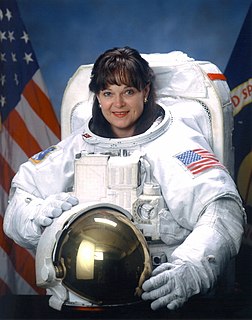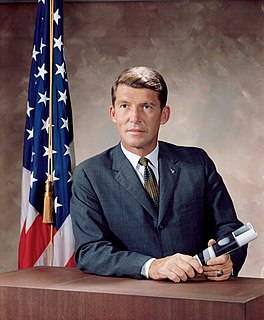A Quote by Buzz Aldrin
We should've asked China to be a portion of the space station. We should've worked out ways that we can... just give away the technology that we have that puts things up into space, with cooperation up above the atmosphere that's needed to help each other.
Related Quotes
One of the things that makes it so challenging is that we're constructing the Station hundreds of miles above the surface of the Earth and we're doing it one piece at a time For the International Space Station we do not have the privilege of assuming the Space Station is on the ground before we take it up one piece at a time. So we have to be very clever about the testing that we do and the training that we do to make sure that each mission is successful, and that each piece and each mission goes just as it's planned.
When Russians were having troubles, the Space Shuttle supported the Space Station Mir bringing up much needed supplies and replacements, critical spares, really. That they were able to keep their space station going for much longer than they would have without us. So, I think that shows the value of international cooperation.
Cooperating in something as visible as space exploration and space flight can only improve relations between the two countries because what happens is, you're working on a common project in a very visible light and so, you're motivated to not have conflicts with each other in other areas. And bringing up China is a good example. In the early '90's, China got serious about wanting to launch astronauts into space and they were actually quite successful in launching many communication satellites. They went ahead and in 2003 they launched their first astronaut into space.
In 2006, I became the fist American to be allowed to go visit their astronaut center in China in Beijing. I think that it makes sense for the U.S. to work with China in the future and I hope to see, if the political atmosphere between the United States and China allow for us to do more cooperation together, especially in the area of human space flight. I think in the same way that it's help improve the relations between the U.S. and Russia; it would help to improve the relations between the U.S. and China.
In 2009 I went up on the space shuttle. I was in space for 16 days and docked at the space station for 11 days. The entire crew did five space walks, of which I was involved with three of them. When you're doing a space walk, you always have a buddy with you. It's a very dangerous environment when you're doing a space walk.
The training kicked in and we quickly went through our emergency procedures, I took manual control and I got the spacecraft under control and stopped about 50 meters from the space station. So, the net effect of the failure was that we were actually turning and speeding up towards the space station when we should have been slowing down, so it was quite a dangerous situation. But we got manual control, performed the first manual docking to the station at night. The training pays off. It was just automatic. We had our books out already, we went right to the right procedures and executed them.
The only two countries who will be able to launch people into space will be Russia and China. I've seen the Russian technology up close and I've had a chance to look at some of the Chinese technology. It's a very high level. They have good hardware and what China lacks is operational experience. But as they gain more experience, as they fly more missions, they'll catch up quickly. The U.S. does face the possibility of losing the lead in human space flight during this period of what we call the gap.
By 1973, we had a space station, the Skylab, and we had multiple probes going up to planets. So, all this wonderful stuff happened in 10 to 15 years. About that time, there should have been enormous initiatives to make it affordable for people to fly in space, not just a handful of trained NASA astronauts and Russian cosmonauts.
We tried so hard. We were always trying to help each other. But not because we were helpless. He needed to get things for me, just as I needed to get things for him. It gave us purpose. Sometimes I would ask him for something that I did not even want, just to let him get it for me. We spent our days trying to help each other help each other. I would get his slippers. He would make my tea. I would turn up the heat so he could turn up the air conditioner so I could turn up the heat.




























